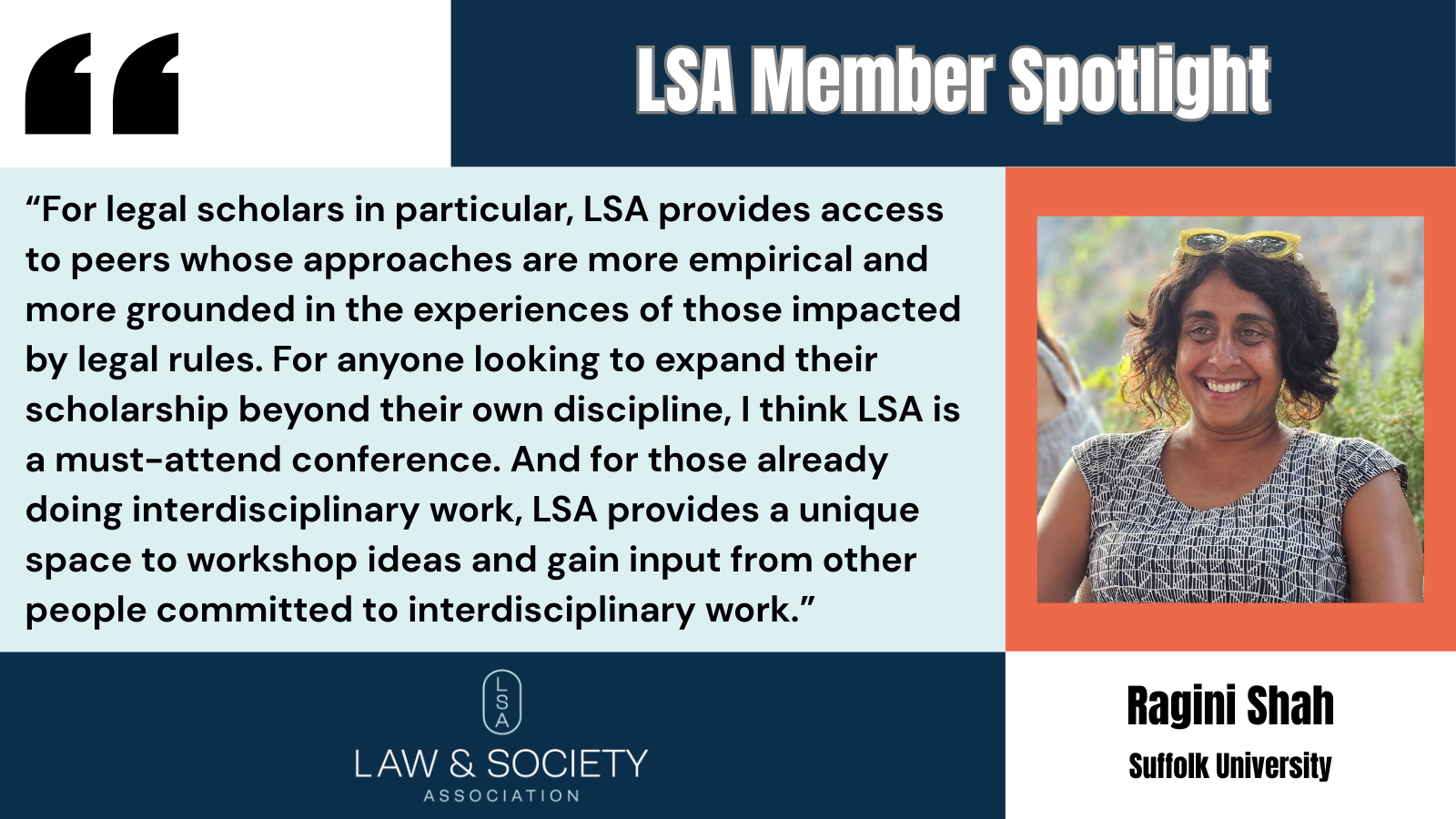Get to know Ragini Shah!

Institution:
Suffolk University Law School
Clinical Professor of Law, Founding Director of Immigrant Justice Clinic
Number of years as LSA member:
10
Number of LSA Meetings Attended:
4
Other Association Affiliations:
Association of American Law Schools
Areas of Research:
Migration Studies
Favorite Topics to Teach or Research:
Movement Lawyering
Immigrant Justice
Migrants’ Social Movements
Unique Skill or Fact:
After working as a lawyer for two years defending tenants in south Brooklyn facing eviction, I took a break to pursue my passion for acting. I was honored to join the Rising Circle Theater Collective, a group of artists of color who self-wrote and produced original works of theater. I spent five years with the Collective and acted in three different productions during that time.
Additional Hobbies:
Paddleboarding
Travel
Learning new languages
Notable Awards:
Justice at Work Solidarity Award | 2024
Suffolk Women’s Alumni Association Teaching Award | 2024
Top Three Books and/or Publications:
Constructed Movements: Extraction and Resistance in Mexican Migrant Communities (University of California Press, 2024)
“Laying the Legal Foundation for A Right to Stay in Deported Americans,” 50 Southwestern Law Review 319 (2020).
“Sharing the American Dream: Towards Formalizing Status for Long Term Resident Immigrant Youth,” 39 Columbia Human Rights Law Review 637 (2008).
Education:
JD, Northeastern University
BS, Northwestern University | Social Policy
Major Appearances:
“Unpacking Immigration Policy in the 2024 Presidential Race,” Election Connection, October 31, 2024.
“A showdown of prosecutors looms as DA mulls charges against ICE agent,” WBUR Morning Edition, April 14, 2025.
“Massachusetts Has Eight Sanctuary Cities and How They Cooperate Varies,” CBS News Boston, September 15, 2022.
What do you find the most beneficial about being an LSA member?
LSA has allowed me unparalleled access to scholarship from experts outside of my field. As a legal scholar, it has been vital to my own research and teaching to hear from people in the social sciences and humanities whose approach to migration has informed my own understanding beyond the legal rules and experiences of clients. It was attending LSA that helped inspire me to conduct further research into Mexican migration, which ultimately led me to publish a book on the topic.
Each year, I hear about work that I never would have heard about but for the conference. Just this past year, I attended the New Books in History panel and discovered The Migrant’s Jail by Brianna Nofil. Now that I have had a chance to review the book, I will be using it in my class.
It is this access to people writing on issues that intersect with the law, but who are writing from perspectives outside of the legal academy, that has been most useful to me as a legal scholar.
Why should professionals or students join LSA?
For legal scholars in particular, LSA provides access to peers whose approaches are more empirical and more grounded in the experiences of those impacted by legal rules. For anyone looking to expand their scholarship beyond their own discipline, I think LSA is a must-attend conference. And for those already doing interdisciplinary work, LSA provides a unique space to workshop ideas and gain input from other people committed to interdisciplinary work.
The size of the LSA conference offers the opportunity for a scholar’s work to become widely known.
LSA membership also gives scholars access to LSA’s grants and consideration for LSA’s awards.
Learn more about Ragini Shah, her many publications, media appearances, awards, and involvement with academic organizations here.


